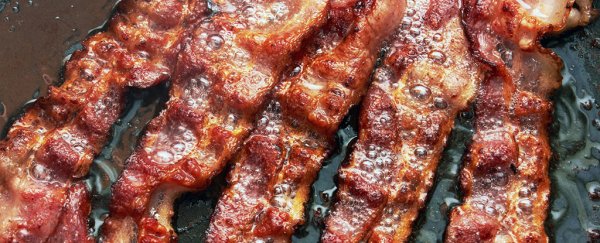Tell the internet that bacon contains cancer-causing substances and everybody loses their minds. But now, food industry researchers have come up with a clever trick that could improve the health rating of many smoked foods - and bacon could be on that list.
People have been smoking food for thousands of years, but we can't escape the fact that smoky chemicals, despite their delicious flavour, are not the best thing for us.
"We know from the tobacco industry that smoke contains carcinogens, and we also know that these carcinogens - which are primarily poly-aromatic hydrocarbons - are present in food," says chemist Jane K. Parker from the University of Reading, UK.
Of course, the concentration of these compounds in food varies a lot, and we don't need to automatically assume the worst.
"At the moment there is no direct link between an increase in consumption of smoked foods and an increased incidence in cancer," says Parker.
"We believe, however, that we should be reducing the levels of these compounds in food to levels that are as low as reasonably achievable."
For the past several years, scientists from The Flavour Centre led by Parker have teamed up with researchers in the food industry to come up with ways to remove these polycyclic aromatic hydrocarbons (PAHs) from smoke without compromising flavour.
With inspiration from filters commonly used in the automotive industry, they're now sharing their findings with the rest of the chemistry community - and we must admit their method sounds pretty ingenious.
The answer lies with zeolite - a type of porous mineral combining aluminium, silicon and oxygen. Zeolites are super-popular as filter media, used not just in car tailpipes but also in water filtration systems.
For the purposes of purifying smoke, zeolite is a great option because it's already used for cutting down on environmental PAHs - an issue increasingly targeted by European Union regulations.
And as it turns out, it can definitely be used to produce 'cleaner' smoke that can in turn make food more flavoursome.
"We have demonstrated that the smoke filtered through the zeolite is far from tasteless and has flavour properties very similar to the unfiltered smoke," the team writes in their study.
The researchers optimised zeolite filters specifically for use in food smoking, and found that, amongst other things, they were able to remove as much as 93 percent of benzo(a)pyrene, a highly carcinogenic PAH produced by burning organic matter at high temperatures.
The team used mass spectrometry to analyse the differences between filtered and non-filtered smoke, finding that compounds with a larger molecular weight were the first to be trapped. They're hoping to do more work to understand precisely how their zeolite filter is trapping various compounds.
Best of all, when the researchers used the filtered smoke to flavour several foods, a panel of expert tasters deemed these foods to have a more balanced flavour, with less of the harsh notes that smoked foods sometimes have.
Besmoke, the food company co-funding the research, already has a bunch of smoked products available, including various spices and even smoked water.
There's no sight of smoked meats just yet in their product range, so let's keep our fingers crossed that this "clean" smoking technology won't get stuck behind a patent and will become more widespread.
Of course, there are other reasons why bacon may not be the best thing to eat on the regular- like high fat and salt content. But we're still hoping that some new-fangled pure-smoked bacon can make its way to our plates as soon as possible.
And while we wait, there's also that 'superfood' seaweed that tastes like bacon. What a time to be alive.
The research was published in the Journal of Agricultural and Food Chemistry, and presented at the 255th national meeting of the American Chemical Society.
